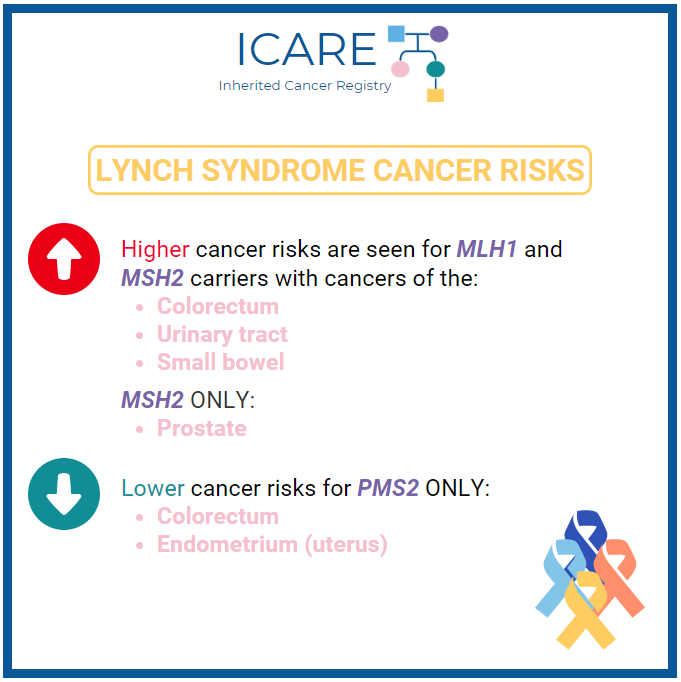 A worldwide study reporting on cancer risks among individuals with mutations in Lynch syndrome genes showed that there are substantial differences in cancer risks across the various genes.1 Specifically, the risk for colorectal cancer in those with MLH1, MSH2, and MSH6 mutations was substantially higher than what was seen for those with PMS2 mutations. Additionally, the risk for prostate cancer among men with an MSH2 mutation was elevated at ~30% lifetime risk, with higher risks among men over 50 years of age. Additionally, the risks of cancers of the urinary tract and small bowel were higher among those with MLH1 or MSH2 mutations. MLH1 or MSH2 carriers over the age of 50 had the highest risks for urinary tract and small bowel cancers. Another study focused on PMS2 and MSH6 carriers found that overall risks for colorectal cancer to age 70 was 8.7% and 11.8%, respectively.2 For PMS2, colorectal cancer risk for men was 9.9%, whereas for women it was lower at 5.9%. For MSH6, risks were similar between men and women at 10% and 11.7%, respectively. It remains important to refine cancer risks across the various Lynch syndrome genes as this information is needed to develop gene-specific cancer risk management guidelines.
A worldwide study reporting on cancer risks among individuals with mutations in Lynch syndrome genes showed that there are substantial differences in cancer risks across the various genes.1 Specifically, the risk for colorectal cancer in those with MLH1, MSH2, and MSH6 mutations was substantially higher than what was seen for those with PMS2 mutations. Additionally, the risk for prostate cancer among men with an MSH2 mutation was elevated at ~30% lifetime risk, with higher risks among men over 50 years of age. Additionally, the risks of cancers of the urinary tract and small bowel were higher among those with MLH1 or MSH2 mutations. MLH1 or MSH2 carriers over the age of 50 had the highest risks for urinary tract and small bowel cancers. Another study focused on PMS2 and MSH6 carriers found that overall risks for colorectal cancer to age 70 was 8.7% and 11.8%, respectively.2 For PMS2, colorectal cancer risk for men was 9.9%, whereas for women it was lower at 5.9%. For MSH6, risks were similar between men and women at 10% and 11.7%, respectively. It remains important to refine cancer risks across the various Lynch syndrome genes as this information is needed to develop gene-specific cancer risk management guidelines.
1Dominguez-Valentin, et al. Genet Med. 2020 Jan. PMID: 31337882; 2Suerink et al. Genet Med. 2019 Dec. PMID: 31204389
Social media post: https://tinyurl.com/ICARE202027
